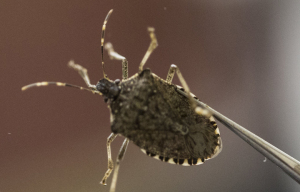 |
| Stink bug (Steve Ringman/The Seattle Times) |
On a hot June day, Joe Beaudoin ducked into the shade of his orchard to check for peaches with shallow dimples — the telltale signs left by the brown marmorated stink bug. This invader from Asia has a formidable appetite for the berries, tree fruits and vegetables that Beaudoin grows on his 80-acre farm. This spring, even before the trees sprouted all their leaves, the bug already had begun to pierce the tiny peaches to suck out juice. Hal Bernton reports. (Seattle Times)
Panel: Coal port would lift Whatcom economy
People at an invitation-only meeting hosted by pro-business groups on Monday, June 22, heard a message most of them agreed with. If the growth of Whatcom County’s post-recession economy is going to catch up to the rest of the state, it would help if a proposed 54 million-metric-ton export terminal for coal and other bulk goods was built at Cherry Point. That was the message during a panel discussion at the meeting held in Fox Hall at Hampton Inn…. U.S. Rep. Rick Larsen, D-Everett, one of the speakers at the luncheon, reiterated his support for Gateway Pacific Terminal, saying it was one solution to Whatcom’s weak employment numbers. Ralph Schwartz reports. (Bellingham Herald)
Burrard Inlet visited by killer whales, just in time for Aquarium app announcement
A pod of killer whales has been spotted in Burrard Inlet. The group of at least four orcas was first reported off the Stanley Park Seawall Monday morning, and has since been seen crossing back under the Lions Gate Bridge and out of the inlet. The black and white visitors came just as the Vancouver Aquarium announced a new smartphone app meant to help marine mammal scientists learn more about whales, dolphins and sea turtles on the B.C. coast. The B.C. Cetacean Sightings Network, an aquarium conservation program, launched its new WhaleReport app on Monday, allowing boaters and ecotourists to report sightings with the touch of a button. Users can view a species identification guide and then upload photos of the animal and automatically enter accurate GPS. Bethany Lindsay reports. (Vancouver Sun)
Project to move Squalicum Creek will help water quality
A $1.8 million project will re-route Squalicum Creek around Sunset Pond to improve water quality and otherwise make the creek more habitable for salmon and other wildlife. The project is expected to start July 6. It will put the creek into 5,100 feet of new stream channel to bypass Sunset Pond. Squalicum Creek doesn’t meet state standards for water quality and is listed as impaired by the Washington state Department of Ecology. Problems include fecal coliform bacteria, too-warm temperatures and dissolved oxygen levels that are inadequate. Declining salmon stocks also are a concern. Kie Relyea reports. (Bellingham Herald)
B.C. ocean observation project useful for oil industry: report
A subsea observation system being built by Ocean Networks Canada at the University of Victoria lets Girl Guides explore the ocean floor and will let scientists detect underground earthquakes or predict tsunamis. The federal government has sunk more than $30-million into the project, and not just for pure science: An internal government document shows Ottawa is interested primarily because it can help “responsible resource development.” In particular, it says, information from the Smart Oceans project could support the development of pipelines linking the Alberta oil sands to the Pacific coast. Dene Moore reports. (Globe and Mail)
Feds Paying for Sewer Analysis of Pot Usage in Washington
The federal government is chipping in money for a three-year pilot study using sewage samples to determine levels of marijuana use in two Washington cities — research that could help answer some key questions about pot legalization, the University of Puget Sound announced Monday. The National Institutes of Health has agreed to pay $120,000 so Dan Burgard, an associate chemistry professor, can conduct a three-year study that will look at how per-capita pot use changed after Washington's first legal pot shops opened last July. The research, based on methods first developed by scientists in Italy in 2005, involves analyzing wastewater samples for levels of metabolites produced when the body processes drugs. Gene Johnson reports. (Associated Press)
How to save wild salmon with a fork and knife
If we demand wild salmon on our plates, we are demanding healthy habitat where wild salmon can thrive in perpetuity. Mark Titus and Tom Douglas opine. (Seattle Times)
Now, your tug weather--
WEST ENTRANCE U.S. WATERS STRAIT OF JUAN DE FUCA- 900 PM PDT MON JUN 22 2015
TONIGHT
W WIND 5 TO 15 KT. WIND WAVES 1 OR 2 FT. W SWELL 2 FT AT 15 SECONDS.
TUE
W WIND 5 TO 15 KT. WIND WAVES 1 OR 2 FT. W SWELL 2 FT AT 14 SECONDS.
TUE NIGHT
W WIND 10 TO 20 KT. WIND WAVES 1 TO 3 FT. W SWELL 2 FT AT 15 SECONDS.
--
"Salish Sea News & Weather" is compiled as a community service by Mike Sato. To subscribe, send your name and email to msato@salishseacom.com. Your email information is never shared and you can unsubscribe at any time.
Salish Sea News: Communicate, Educate, Advocate
Follow on Twitter. http://twitter.com/#!/savepugetsound/
Salish Sea Communications: Truth Well Told
No comments:
Post a Comment
Note: Only a member of this blog may post a comment.